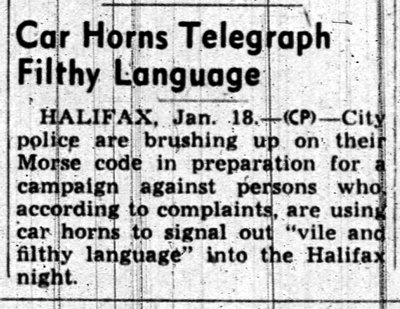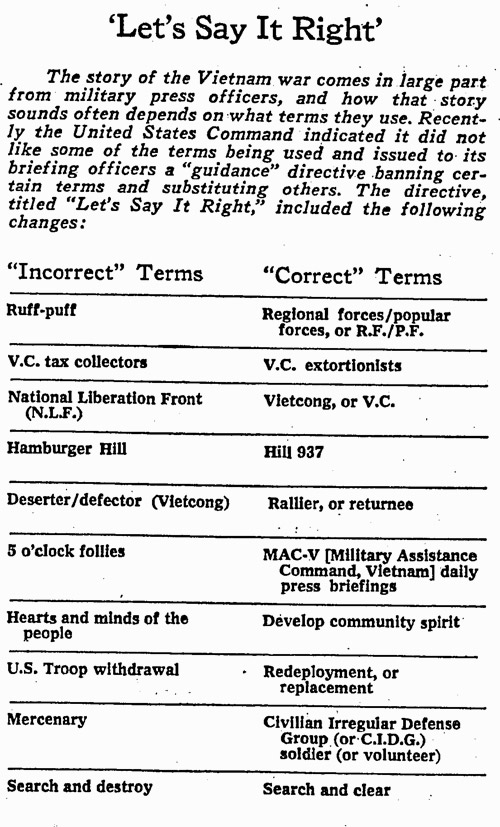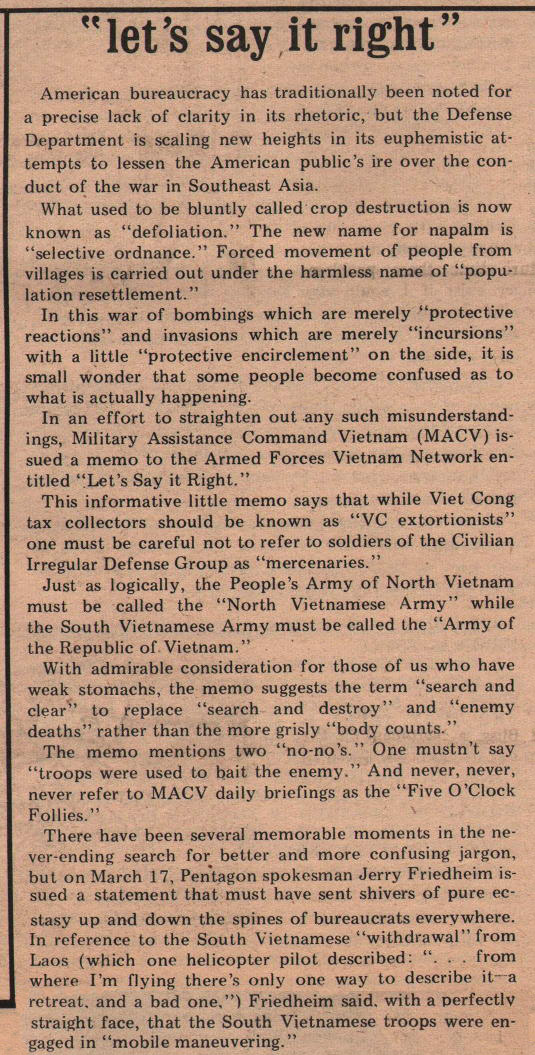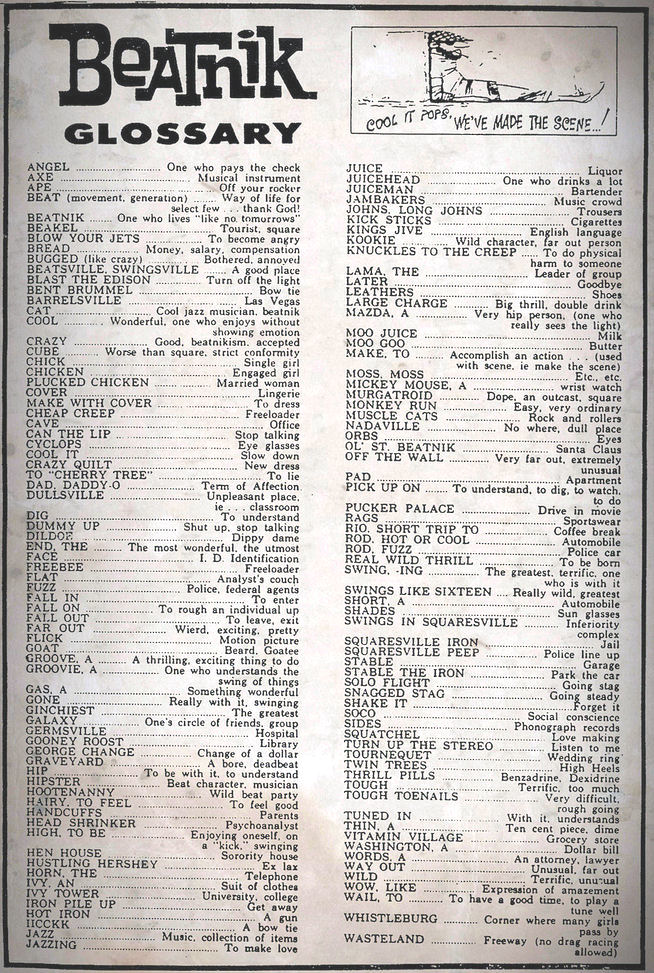Languages
Horn OK Please
Atlas Obscura does a great job explaining the wacky phrase from India, "Horn OK Please." But they do not place the video of the song that uses the same title upfront enough for my tastes!
Posted By: Paul - Tue May 23, 2017 -
Comments (1)
Category: Languages, Slang, Motor Vehicles, India
Quoz!
Quoz was the "whatever" of the 19th century.From Charles Mackay's Extraordinary Popular Delusions and the Madness of Crowds (1841):
But, like all other earthly things, Quoz had its season, and passed away as suddenly as it arose, never again to be the pet and the idol of the populace.
Posted By: Alex - Sat Apr 15, 2017 -
Comments (1)
Category: Languages, Slang, Nineteenth Century
The Backward Index
Between the 1930s and 1970s, employees at Merriam-Webster created a massive "backward index." It was a card catalog, containing all the words in its dictionary typed backwards. It eventually included around 315,000 index cards.The reason for creating this thing was to allow the company to find words with similar endings. Such as all words ending in 'ological'. It also helped them create a rhyming dictionary.
Computers made the backward index obsolete, but it still sits in the basement of the company's headquarters.
More info: Merriam-Webster
Posted By: Alex - Tue Apr 04, 2017 -
Comments (5)
Category: Languages, Collectors
Andor vs. And/Or
February 1953: The Georgia House of Representatives voted to make "andor" a legal word and directed that it should henceforth be used in place of the phrase "and/or." The House defined "andor" to mean, "either, or, both, and, and or or, and and or."However, the Georgia Senate voted against the bill.
More info: NY Times (Feb 21, 1953)

Minneapolis Star Tribune - Feb 28, 1953

The East Liverpool (Ohio) Evening Review - Feb 26, 1953
Posted By: Alex - Wed Jan 18, 2017 -
Comments (5)
Category: Languages, Law
Vile and Filthy Morse Code
January 1945: Residents of Halifax complained to the police that people were driving around at night and using their horns to signal "vile and filthy language" in morse code.So it wasn't the honking, per se, that bothered the residents, but what the honks meant. Guess it was a different time, when a significant number of people actually understood morse.

Ottawa Journal - Jan 18, 1945
Posted By: Alex - Fri Dec 09, 2016 -
Comments (6)
Category: Languages, 1940s
Let’s Say It Right
In October 1969, the U.S. Command in Vietnam issued a directive titled "Let's Say it Right" to the American Forces Vietnam Network (AFVN). The directive forbid military press officers from using certain terms and provided a list of acceptable terms in their place.For instance, instead of referring to "free firing zones" in which anything that moved was considered enemy and could be fired at, officers were supposed to say "pre-cleared firing zones." And instead of "lull" they were supposed to refer to "light and scattered action."
A military spokesman said that the directive was actually just a "style sheet" whose purpose was to "get everyone using similar words."
Some more of the "no-no" words (as AFVN officers described them) were listed in this NY Times piece:

New York Times - Jan 11, 1970

GI Press Service - April 1971
Posted By: Alex - Fri Nov 04, 2016 -
Comments (5)
Category: Languages, Military, 1960s
1960’s Beatnik Glossary
Contributed by "hotsauce269".
Posted By: Alex - Fri Oct 28, 2016 -
Comments (4)
Category: Languages, Slang, 1960s
Proper storage of warheads
A classic example of "officialese," which came to light in 1951. Text from a Royal Navy instruction manual on the proper storage of torpedo warheads:
The Decatur Herald - Aug 30, 1951

Green Bay Press-Gazette - Apr 22, 1962
Posted By: Alex - Thu Oct 27, 2016 -
Comments (4)
Category: Government, Regulations, Languages
The Royal Handbag Code

While on a lecture tour of the United States in 1990, Raymond Fullager, an expert on the British royal family, revealed the existence of a royal handbag code. According to him, the Queen of England used her purse to communicate secret signals to her staff.
Fullager claimed to have identified 23 different signals she used. For instance, if she moved her purse from her right to her left arm it meant that she was bored and needed to be rescued. A lady-in-waiting would then approach and say, "I'm afraid, ma'am, that you are running 10 minutes behind schedule."
If the handbag was securely gripped on her left arm, it meant that all was well.
Fullager refused to reveal all 23 signals, insisting that they needed to be kept a royal secret. But he did share some of the Queen's other body-language code. For instance, if she rubbed the middle finger on her left hand, it meant that a spectator was getting too close.
However, other royal experts were skeptical of Fullager's handbag-code theory. Gossip columnist Nigel Dempster declared that the code theory was "silly" and "just rubbish."
Andrew Morton said, "Frankly, you've got to wonder if anyone can actually do 23 different things with a handbag."
More info: Philly.com (Sep 14, 1990)

LA Times - Aug 8, 1990
Posted By: Alex - Tue Aug 23, 2016 -
Comments (4)
Category: Languages, Royalty
Jackety Jack
Your language lesson for the day.
Posted By: Paul - Wed May 25, 2016 -
Comments (4)
Category: Languages, Music, 1950s

| Who We Are |
|---|
| Alex Boese Alex is the creator and curator of the Museum of Hoaxes. He's also the author of various weird, non-fiction, science-themed books such as Elephants on Acid and Psychedelic Apes. Paul Di Filippo Paul has been paid to put weird ideas into fictional form for over thirty years, in his career as a noted science fiction writer. He has recently begun blogging on many curious topics with three fellow writers at The Inferior 4+1. Contact Us |




